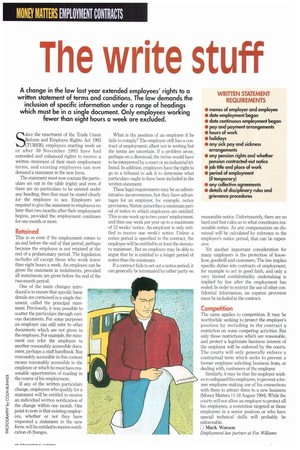The write stuff
Page 50

If you've noticed an error in this article please click here to report it so we can fix it.
A change in the law last year extended employees' rights to a written statement of terms and conditions. The law demands the inclusion of specific information under a range of headings which must be in a single document. Only employees working fewer than eight hours a week are excluded.
Since the enactment of the Trade Union Reform and Employee Rights Act 1993 (TURER), employees starting work on or after 30 November 1993 have had extended and enhanced rights to receive a written statement of their main employment terms, and existing employees can now demand a statement in the new form.
The statement must now contain the particulars set out in the table (right) and even if there are no particulars to be entered under any heading, then that must be stated clearly for the employee to see. Employers are required to give the statement to employees no later than two months after their employment begins, provided the employment continues for one month or more.
Retained
This is so even if the employment comes to an end before the end of that period, perhaps because the employee is not retained at the end of a probationary period. The legislation includes all except those who work fewer than eight hours a week An employee can be given the statement in instalments, provided all instalments are given before the end of the two-month period One of the main changes introduced is to ensure that specific basic details are contained in a single document, called the principal statement. Previously, it was possible to scatter the particulars through various documents. For some purposes an employer can still refer to other documents which are not given to the employee. For example, the statement can refer the employee to another reasonably acres.sible document, perhaps a staff handbook. But reasonably accessible in this context means reasonably accessible to the employee or which he must have reasonable opportunities of reading in the course of his employment.
If any of the written particular:change, employees who qualify for a statement will be entitled to receive an individual written notification of the change within one month. One point to note is that existing employees, whether or not they have requested a statement in the new form, will be entitled to receive notification of changes. What is the position of an employer if he fails to comply? The employee still has a contract of employment, albeit not in writing but the terms are uncertain. If a problem arose, perhaps on a dismissal, the terms would have to be interpreted by a court or an industrial tribunal. In addition, employees have the right to go to a tribunal to ask it to determine what particulars ought to have been included in the written statement.
These legal requirements may be an administrative inconvenience, but they have advantages for an employer, for example, notice provisions. Statute prescribes a minimum period of notice to which employees are entitled. This is one week up to two years' employment, and then one week per year up to a maximum of 12 weeks' notice. An employer is only entitled to receive one week's notice. Unless a notice period is specified in the contract, the employee will be entitled to at least the statutory minimum . But an employee may be able to argue that he is entitled to a longer period of notice than the minimum.
If a contract fails to set out a notice period, it can generally be terminated by either party on reasonable notice. Unfortunately, there are no hard and fast rules as to what constitutes reasonable notice. As any compensation on dismissal will be calculated by reference to the employee's notice period, that can be expensive.
Yet another important consideration for many employers is the protection of knowhow, goodwill and customers. The law implies specific duties into contracts of employment, for example to act in good faith, and only a very limited confidentiality undertaking is implied by law after the employment has ended. In order to restrict the use of other confidential information, an express provision must be included in the contract.
Competition
The same applies to competition. It may be worthwhile seeking to protect the employer's position by including in the contract a restriction on some competing activities. But only those restrictions which are reasonable, and protect a legitimate business interest of the employer will be enforced by the courts. The courts will only generally enforce a contractual term which seeks to prevent a former employee soliciting business from, or dealing with, customers of the employer.
Similarly, it may be that the employer wishes to safeguard his employees, to prevent a former employee making use of his connections with them to attract them to a new business (Money Matters 11-18 August 1994). While the courts will not allow an employer to protect all his employees, a restriction targeted at those employees in a senior position or who have special technical skills will probably be enforceable.
II Mark Watson Employment law partner at Far Williams






















































































































